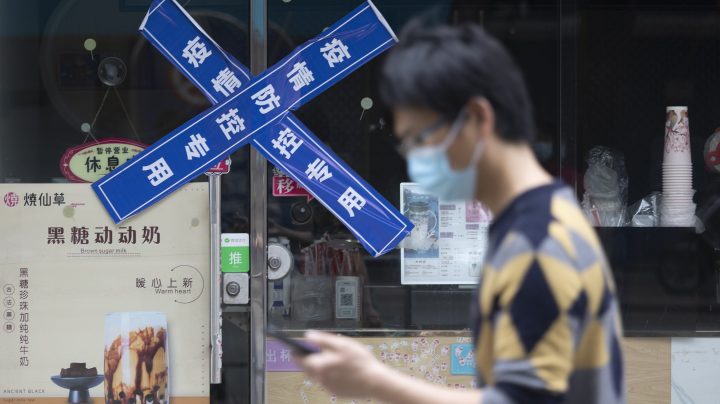
Cities in China not under lockdown still feel the pain
Cities in China not under lockdown still feel the pain

The northern Chinese city of Tianjin has been out of a lockdown since last month, but businesses there are still not able to work normally.
“Forty percent of our local members here had to halt the production temporarily as they were running out of material [from other parts of China in lockdown],” Christoph Schrempp, chair of the Tianjin chapter of the European Union chamber of commerce, said at a news conference last week.
China has wrestled COVID-19 cases back under 1,300 cases per day after a strict seven-week lockdown in Shanghai, where most infections are concentrated.
A recent study by Shanghai’s Fudan University estimates that lifting China’s zero-tolerance for COVID policy will result in 1.6 million deaths, given the country’s weak critical care infrastructure and low vaccination rate among the elderly population.
“The question all of us have is, ‘When is China going to have a massive vaccination campaign or even offer a vaccination mix in order to create an environment where you don’t have to lock down because your people have a certain amount of herd immunity?’” Joerg Wuttke, president of the European chamber, said. “We don’t see any of that at this stage.”
Whereas the lockdown in the early stages of the pandemic outbreak helped factories in China resume operations within months to fulfill orders overseas, the same playbook has been less effective against the more infectious omicron variant. Even in Chinese cities where restrictions are not as tight, many businesses, particularly foreign ones, said their operations are not operating as normal.
In addition to cargo not getting through smoothly, business travel, even between cities, is tough.
Massimo Bagnasco, chair of the southwest China chapter of the European chamber in Chengdu, had plans last week to hold an event in Chongqing.
“I was told that to move for less than 24 hours from Chengdu to Chongqing, both cities without any high-risk zones, I should have at least four COVID tests,” Bagnasco said at the news conference.
Then, he said the Chongqing government reduced the maximum number of people allowed at an event to 50. Bagnasco moved the event back online.
The requirements are even more onerous for travelers coming from abroad. There is extensive testing, a mandatory centralized quarantine of a minimum of 10 days, followed by home quarantine. The northeastern city of Shenyang is perhaps the most stringent with inbound travelers.
“We are still at 28 plus 28,” said Harald Kumpfert, chair of the Shenyang chapter of the EU chamber. That means 28 days of quarantine in a government facility, plus another 28 days of home quarantine.
Kumpfert said these COVID restrictions make it hard to attract new overseas investment and foreign talent.
Even if a foreign company based in China has an all-local staff, the Chinese government announced last week that its citizens can only travel overseas for “essential” trips.
“Many of the employees of our member companies [are] really shocked about this because obviously they are not allowed to travel anymore and this … makes communication and exchange with the headquarters very difficult,” said Bettina Schoen-Behanzin, the chair of the European chamber Shanghai chapter.
Chinese government media insist China is still a great place to do business. Foreign direct investment in the first four months of this year rose over 20% from 2021.
But those investment decisions were made years in advance, said Michael Hart, the president of the American Chamber of Commerce in China, at a news conference. He is not sure the money will keep rolling in.
“Unfortunately, the COVID lockdown this year and the restrictions for the past two years are going to mean three, four, five years from now we will see investment decline most likely,” Hart said.
Beijing, where he lives, is on the verge of a lockdown, and Tianjin seems to be sliding back into one too.
Business leaders say they don’t see an exit ramp when the rest of the world is learning to live with the virus and opening.
Additional research by Charles Zhang.
There’s a lot happening in the world. Through it all, Marketplace is here for you.
You rely on Marketplace to break down the world’s events and tell you how it affects you in a fact-based, approachable way. We rely on your financial support to keep making that possible.
Your donation today powers the independent journalism that you rely on. For just $5/month, you can help sustain Marketplace so we can keep reporting on the things that matter to you.


















